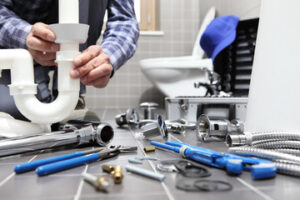A career as Plumber Sarasota can be both challenging and rewarding. It can be physically demanding and requires a long training period. It also involves responding to emergency calls, such as burst pipes.
The plumbing industry includes tradespeople who specialize in installing, maintaining, and repairing pipes and fixtures. These systems facilitate the distribution of water, gas, and waste in residential, commercial, and industrial settings.
Plumbers use a wide range of tools and skills to diagnose and repair problems, including leaks, clogs, and malfunctioning appliances. They also inspect and maintain pipes, drains, and sewer lines to ensure they are functioning properly.
There are several different career paths for plumbers, depending on their specific skills and experience. For example, residential plumbers work on plumbing systems in homes and apartments. They may also install new plumbing systems as part of a construction project. These plumbers often interact with customers, so good communication skills are essential.
Some plumbers choose to work as independent contractors. This allows them to set their own hours and choose which projects to take on. However, it’s important for plumbers to be familiar with local regulations and standards. In addition, plumbing work can be physically demanding, requiring workers to climb and navigate tight spaces. Plumbers should also be prepared for the possibility of exposure to dangerous chemicals and sewage.
Plumbing is a skill that can be learned through on-the-job training or formal education. In many states, plumbers must be licensed in order to perform their duties. Licensing requirements vary by state, but typically include a combination of on-the-job training and classroom coursework. Plumbers who are interested in pursuing a career in the field should consider taking courses that focus on pipe fabrication, installation and inspection, and customer service.
In addition to plumbing, there are many other skilled trades that can be found on SkillHero, such as HVAC and Electrical. These jobs require a high level of skill and training, but can offer excellent pay and job stability.
Education and training requirements
Plumbing is a career that offers stability, excellent pay, and the ability to directly impact people’s lives. It is also a field that requires specialized education and training, so it’s important to understand the requirements before starting. The first step is obtaining a high school diploma or GED certificate, which is the minimum requirement to start training as a plumber. After this, you can enroll in a vocational program at a local trade school. These programs often offer a combination of classroom and hands-on learning, which can help you gain the necessary skills to begin your career.
During the classroom portion of your plumbing training, you will learn about plumbing basics such as pipe systems, safety, and installation techniques. You’ll also have the opportunity to develop soft skills like customer service and problem-solving, which will be valuable in your future career. You should also consider securing a mentor as you train so that you can get the most out of your experience.
Once you’ve completed your training, it’s time to put your knowledge into action. Many apprenticeship programs offer on-the-job training that allows you to work with experienced plumbers and master the craft. You’ll learn how to read blueprints, assemble pipes, and install and repair various types of fixtures in residential, commercial, and industrial buildings. You’ll also practice your pipe cutting, soldering, and bending skills.
In addition to these technical skills, you’ll need a good working knowledge of the latest industry standards and technologies. Many vocational schools and trade organizations offer continuing education courses that can help you stay up-to-date on the latest developments in plumbing technology and practices. You can also pursue advanced certifications to boost your credibility and job opportunities.
In addition to being a skilled tradesman, a plumber must have strong communication skills. They must be able to explain complex issues to customers and provide them with recommendations that meet their needs. In addition, they must be able to collaborate with other technicians to solve complex problems. These are vital skills that can make a difference in the success of any project.
Work environment
The work environment for a plumber can vary depending on the type of plumbing work. Some plumbers work in residential homes, while others may work on larger-scale commercial or industrial projects. Plumbers also can find work in public buildings, such as schools or hospitals. Regardless of the setting, working as a plumber can be challenging and rewarding.
One of the most important skills for a plumber is attention to detail. This helps them to follow blueprints accurately and ensure that their work meets building codes. It also allows them to avoid mistakes that could lead to leaks or blockages. Other key skills include customer service and communication. Plumbers often interact directly with customers, explaining problems and proposing solutions. Strong customer service skills can help a plumber build trust and promote repeat business.
Plumbing is a physical job that involves a lot of movement and lifting. It also requires the ability to work in tight spaces and stand for long periods of time. This can lead to back, leg, and knee injuries. It is also important to wear safety equipment, such as protective gloves, goggles, and a hard hat. Plumbers may be exposed to chemicals, solvents, and pipe cleaning agents, which can damage the skin and lungs.
Plumbers often have to deal with stressful situations, such as when a pipe bursts or a toilet overflows. They may also have to work outside of normal business hours to respond to emergencies. This can create a lot of stress and anxiety. To reduce these challenges, it is important for plumbers to maintain a healthy work-life balance and seek out regular relaxation activities.
Plumbers are responsible for installing, maintaining, and repairing water and gas pipes. They may also work on heating and cooling systems, as well as fire suppression and sprinklers. They must also be aware of state and local regulations regarding plumbing codes and inspections. Plumbers should also be willing to learn new skills and adapt to changing technology. This career can be exciting and rewarding, but it is important to prepare for the physical and emotional demands of the job before pursuing it.
Job outlook
Plumbing is a highly in-demand occupation, and its job outlook remains good. According to the Bureau of Labor Statistics, the demand for plumbers will continue to grow in the coming years. This is because plumbing services are essential in maintaining the functionality of homes and businesses. Furthermore, new regulations and standards for water efficiency are creating more work for plumbers.
In addition, new construction projects will generate more jobs for plumbers. Many plumbers also choose to become self-employed. This allows them to set their own schedules and rates, which can lead to greater financial rewards. However, it is important for plumbers to continue to keep up with new technologies and skills in order to remain competitive.
Many plumbers choose to specialize in specific fields, such as natural gas lines or water sprinklers. These niches can increase their job prospects in a particular region or industry, and they may even enjoy higher pay than other plumbers in the same field. In addition, some plumbers choose to focus on green plumbing, which is a growing trend in the industry.
Plumbers typically earn a good salary, especially those with extensive experience or specialized skills. In addition to their salaries, they often receive benefits such as health insurance and life insurance. However, it is important for plumbers who are considering a career as a plumber to consider the cost of living in their area, as this can affect their earnings.
The average wage for a plumber depends on several factors, including experience and education level. While a high school diploma is required for entry into this profession, an apprenticeship with a licensed plumber can be very beneficial. A vocational training program will also give students the hands-on experience they need to succeed in the field. In addition, some states require licensure for plumbers, so it is important to check local laws before entering this profession. Plumbers can also find work through online directories and by attending trade shows or networking events. These opportunities can help them meet new clients and establish a solid business network. In addition, it is important for plumbers to wear personal protective equipment (PPE) on the job, such as gloves, goggles, and a hard hat.
